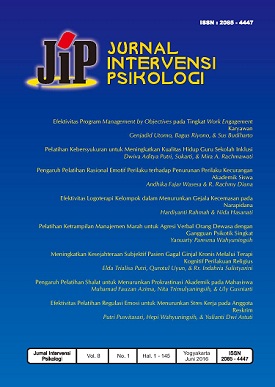Main Article Content
Abstract
The purpose of this study is to examine the effectiveness of religious cognitive behavioral therapy in improving subjective well-being of chronic kidney disease patients. The hypothesis of the study was that there is a significant difference in the subjective well-being between experimental and control groups. Four chronic kidney disease patients with age between 22-45 years old, Muslim, and suffering chronic kidney disease more than 6 months participated this study. The design of this experiment was a quasi experiment with pretest-posttest control group design and follow up. Data were collected with satisfaction with Life Scale (SWLS) from Diener, Emmons, Larsen and Griffin's Scale (1985) and Positive Affect and Negative Affect Schedule (PANAS) from Watson, Clark, and Tellegen's scale (1988). Independent sample t-test was conducted to analyze the data. The result showed that there was a difference life satisfaction between the experimental and control group (t=4, 287, p = 0, 005 (p<0,0l). Also, there were difference on an affection score between the experimental and control group (t = 4, 407, p = 0, 005 (p<0,0l).
Keywords: religious cognitive behavioral therapy, subjective well-being, life satisfaction, affection, chronic kidney disease
Article Details
Authors who publish with this journal agree to the following terms:
- Authors retain copyright and grant the journal right of first publication with the work simultaneously licensed under a Creative Commons Attribution-ShareAlike 4.0 International License that allows others to share the work with an acknowledgment of the work's authorship and initial publication in this journal.
- Authors are able to enter into separate, additional contractual arrangements for the non-exclusive distribution of the journal's published version of the work (e.g., post it to an institutional repository or publish it in a book), with an acknowledgment of its initial publication in this journal.
- Authors are permitted and encouraged to post their work online (e.g., in institutional repositories or on their website) prior to and during the submission process, as it can lead to productive exchanges, as well as earlier and greater citation of published work (See The Effect of Open Access).





